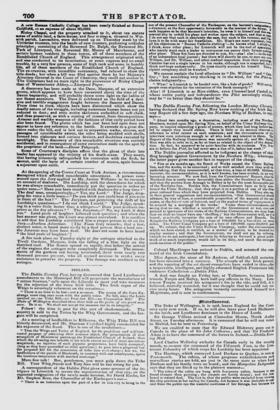IRELAND.
The Dublin Evening Post, having discovered that Lord Lyndhurst's amendments to the Municipal Bill will pet petuate the manufacture of A rotten freemen," calls upon the Liberals to meet end take measures for the rejection of the three Irish hills. This Irish organ of the Whigs is amusingly vehement on the occasion- " There is no time to he lost—not a moment. The rooms of the Corn Ex- change must ring once more with the public voice. No bill, since the Lords insulted us—no Tithe Bill—no Poor-law Bill—no Corporation Bill! The Duke of Wellington described these three bills as time parts of one great mea- sure. Be it so. We shall not aecrpt the measure but in its integrity."
PsheW! the time is past for this sort of shodomontade. The country is sold to the Tories by the Whig Government, and the bar- gain will be completed.
At a meeting of landholders in Kilkenny, the Whig Tithe Dill was bitterly denounced, and Mr. Sharman Crawford highly commended for his exposure of the fraud. This is one of the resolutions-
" That the Whigs and Tories of England, for the perfidious and selflinte. rested purpose of attaining their common object, the perpetuation of that stronghold of Ministerial patronage the Established Church of Irrland, than which the all-seeing sun beholds in his whole course no evil of more monstrous magnitude, no injustice of such gigantic proportions, have lately complied, (long as they have quarrelled on other questions.) to pass into a perpetual liw the proposed bill for the conversion of tithe into rent-charge ; bat we, the landholders of the parish of Blactrath, in common with our countrymen, spurn the insidious temptation with merited contempt."
More fine talk ! But, gentlemen, you must gulp down the Tithe Bill. Your Whig friends and Tory foes will be too strong for you. A correspondent of the Dublin Pilot gives some account of the in- trigues in Limerick to secure the representation of that city, on the expected resignation of the newly-made baronet, Sir David Roche, for Mr. Stephen Rice, the Chancellor of the Exchequer's soil—
There is an intention upon the part of a few in this city to bring in the
son of the present Chancellor of the Exchequer, on tbe baronet'. rssigtegift, retirement, at the first opportunity &Tearable no the interest of the forma. such happens to be that baronet's intention, he ow. it to himself and Wafts meecial say to unfold his plans and wishes' upon the subject, and that at oft I do not say that such is absolutely sks ease, but such is the rumour, rind lb. lives it to be with some fair foundation. Mr. Ruse's son must represent, (5;4 all hie objections to Roman Catholie clothing '—he knows what I allude te,) I think, seine other place; for Limerick will not be the tool of 'peculator% who merely want such a leader to commence eon more their former seeking, after plaee. These few lines are directed to yon, Sir—alas! alas !—in thee of an independent local journal; but there will shortly be one, to save my Ind, William, and Dr. William, and other medical inspectors, from their yearn* Cataline has not a single lawyer in his ranks, although one ia suspected, but I, think and hope undeservedly. fie must shortly account for himself. 'nook,.. cipient conspiracy shall be watched." We cannot explain the local allusions to "Dr. William " and n Cat, ; line ; " but something very shocking is in the wind, for the Pilot el. , claims indignantly- " What ! is Limerick to be handed over, like a bale of goods? Will not tie people even stipulate for the extinction of the Bank monopoly ?" Alas ! if Limerick is so Rice-ridden, even Clonmel [and Cashel, W, whose entire purity and independence the Pilot amusingly stickles.' may be" no better than they should be."


























 Previous page
Previous page